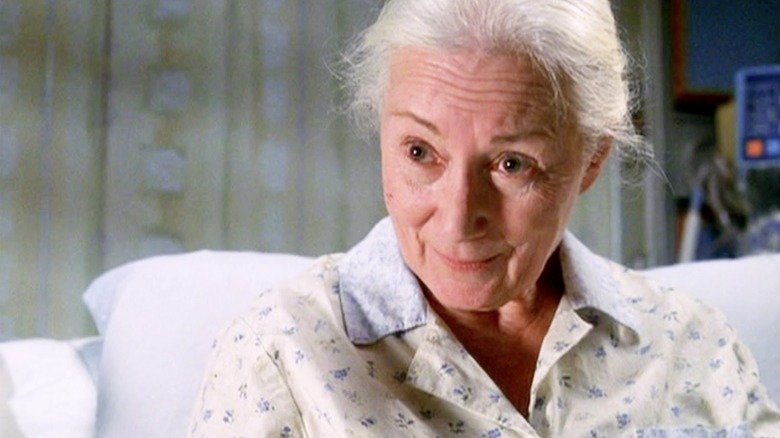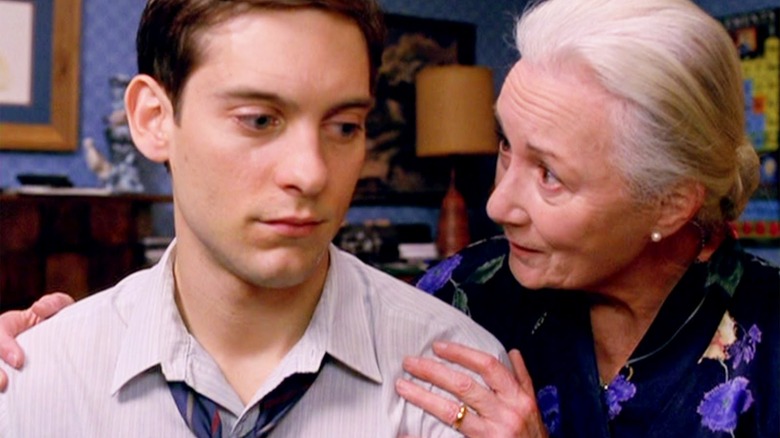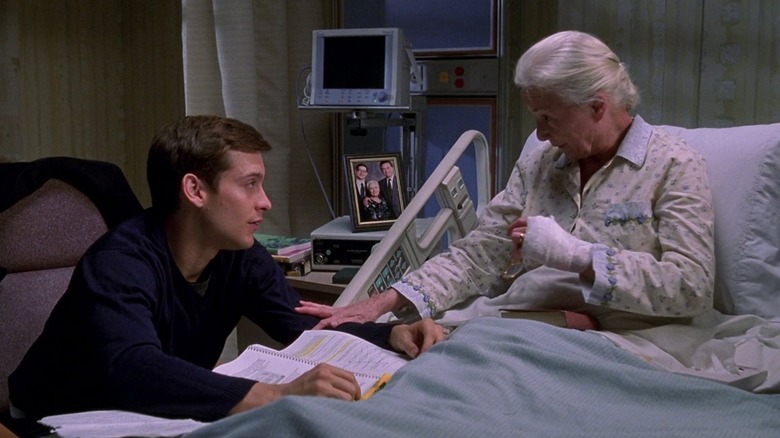Did Aunt May Know About Peter's Superhero Life In Spider-Man 2? Let's Play Fan Theory Detective
The term "alter ego" is a Latin phrase that translates to the beautiful oxymoron of "alternate self." In ancient literature, alternate selves were typically presented as dark omens; doppelgängers and the like. The idea of hiding one's identity and surreptitiously committing acts of heroism perhaps originated in pop literature with the publication of Baroness Orczy's "The Scarlet Pimpernel" in 1905, and was further codified by the publication of Johnston McCulley's "The Curse of Capistrano," the 1919 pulp novel starring Zorro.
I bring up these literary antecedents as the model on which all modern superheroes have been explicitly based. The distance between the Scarlet Pimpernel and the Scarlet Spider is not so great. The appeal of an alter ego, or a secret identity, should be self-evident. Not only does it allow a superhero character to appear as a free agent, outside of the law and free from being identified, but it allows a young reader to project themselves (or someone they know) into the masked costume. I may be nothing now, but none of you know I'm secretly Spider-Man.
The notion of the secret identity remained an important part of superhero lore until, oddly enough, "Iron Man" in 2008. One might note that there are few secret identities in the Marvel Cinematic Universe. This has led to surreal scenes of supernatural beings calling each other "Steve" or "Bucky."
In Sam Raimi's 2004 film "Spider-Man 2," however, the alter ego was still of paramount importance to the lead character (Tobey Maguire). Indeed, Peter Parker's secret identity was a source of a great deal of anxiety, as revealing it would put his aunt May (Rosemary Harris) at risk of villain attack.
But it's entirely possible Peter needn't have worried. Aunt May might have known all along.
Aunt May
Peter's Aunt May, along with his would-be girlfriend Mary-Jane (Kirsten Dunst), are the two Peter is the most concerned about when it comes to keeping his identity secret. He knows that if the world can identify him, he will be hounded by the public at large. Thanks to the salacious Spider-Man coverage in the Daily Bugle, Spider-Man is still not entirely trusted (this played itself out in "Spider-Man: No Way Home," a film that saw Peter moving into a high-rise to avoid rocks being thrown through his window by an angry mob). Additionally, Spider-Man has gotten on the bad side of a number of supervillains, who could easily use his loved ones as kidnapping fodder.
Aunt May, while she lives with Spider-Man, is depicted as innocently unaware. She is a gentle soul and a hardworking everywoman who is blissfully outside of Spider-Man's whirling superhero anxieties. It's her innocence that sparks a lot of Spider-Man's neuroses. He never feels worthy of having a saintly aunt. I prefer my Spider-Man in a constant state of perturbation.
May, however, is no dim bulb, and would certainly have noticed certain things about Peter that might make her suspicious. Some fans, spitballing on Reddit, pointed to the bank heist scene as an example of when she might have caught on. May and Peter are at the bank to work out their money troubles when the wicked Dr. Octopus (Alfred Molina) breaks in to rob the place. It's mayhem. Vault doors are ripped off their hinges and bags of money soar through the air.
Peter flees the scene, hoping to change into his Spider-Man costume in private. May watches him go. Did she think he was merely running in fear? Or did she know where he was going?
Peter, where did you go?
Naturally, a few moments after Peter leaves, Spider-Man appears, and he saves May from Alfred Molina's Doc Ock. They swing through the city. May is now in close proximity to Peter, a boy she raised and probably hugged countless times. Surely, one might assume that hugging Spider-Man would give May a clue. She's dropped off, Spider-Man swings away, and, wouldn't you know it? Peter returns home shortly thereafter. Did May actually think Peter vanished at a crucial moment, only to reappear later to talk?
Later in the film, May is packing bags — she has to move out due to money troubles — and a neighborhood kid named Henry is helping her. Peter has, at that point in the film, given up on being Spider-Man, much to the dismay of many, including Henry. May talks about how real heroes come from inside of all of us, and how they tend to inspire others. Her entire speech is as follows:
"He knows a hero when he sees one. Too few characters out there, flying around like that, saving old girls like me. And Lord knows, kids like Henry need a hero. Courageous, self-sacrificing people. Setting examples for all of us. Everybody loves a hero. People line up for them, cheer them, scream their names. And years later, they'll tell how they stood in the rain for hours just to get a glimpse of the one who taught them how to hold on a second longer. I believe there's a hero in all of us, that keeps us honest, gives us strength, makes us noble, and finally allows us to die with pride, even though sometimes we have to be steady, and give up the thing we want the most. Even our dreams."
You're not Superman, you know
This could easily be seen as something universal about heroism, or even a speech that May is giving to Peter as an example. Or — and it certainly sounds like it — she knows Peter is Spider-Man, knows that he is contemplating giving up the superhero gig, and is actively trying to talk him back into it.
Of course, if May knew that Peter was secretly Spider-Man — and that being Spider-Man was a great source of stress for Peter — why didn't she say anything? Surely she could have told Peter, "I know you're moonlighting as a costumed vigilante, so any pressure you feel about keeping that secret from me can now be lifted." Instead, she feigned ignorance, never letting on that she knew the truth.
May, however, is respectful. Spider-Man was Peter's secret to keep, not her mystery to solve. She respected her nephew enough to let him handle it in the fashion he felt best. No longer a Spider-Boy, May respected Peter's maturity and attempts to grow into a Spider-Man. One might very well compare it to coming out to a parent. A parent may know that their child is queer, but it's not the parent's job to out their child, even in a positive way. Coming out is a personal journey for the kid in question, and it's up to the parent to wait until they're ready to share. Then to hug them and love them and celebrate them when they do. May didn't want to out Peter. That is 100% understandable.
In Sam Raimi's "Spider-Man" continuity, she was an impeccable parent figure, there to calmly offer reassurance, and stand as someone worth protecting.
Personally, I think she knew.



